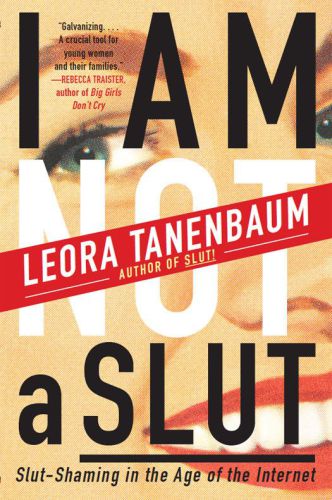
I Am Not a Slut
Slut-Shaming in the Age of the Internet
- اطلاعات
- نقد و بررسی
- دیدگاه کاربران
نقد و بررسی

November 17, 2014
In 1999’s Slut! Growing Up Female with a Bad Reputation, Tanenbaum coined the term “slut-bashing,” which she defines as a “specific form of student-to-student verbal sexual harassment in which a... girl is bullied because of her perceived or actual sexual behavior.” In her new book, the author, who holds a senior position at Planned Parenthood, argues vehemently for the complete abolition of the word “slut” (even when used endearingly among friends or in a politicized attempt to take ownership of the term). Two historical events—the rise of the Internet and the highly publicized SlutWalks of 2011—have occasioned this follow up, in which Tanenbaum laments, “Female bodies have no privacy. They are visible, tagged, posted, circulated, tracked, rated, judged, ‘liked.’ ” Tanenbaum reflects on highly publicized stories of suicide: 17-year-old Alexis Pilkington of Long Island in 2010, who was called a slut on the anonymous confessional website Formspring; 12-year-old Gabrielle Molina of Queens in 2013, after similar experiences online. Meanwhile, in 2011 and 2012, thousands of women across the country marched in solidarity to take ownership of the word. Tanenbaum argues, “To most people, ‘slut’ means ‘disgusting woman who deserves to be shamed.’ ” In other words, “Most people aren’t in on the joke, which creates more problems than it solves.” Tanenbaum’s thesis is timely, provocative, and clearly stated, but the big question that remains is whether her hard line on the subject is realistic or productive.

November 15, 2014
An enthusiastic update on the state of female sexual liberation in contemporary society. Fifteen years after her well-received book on sexual stereotyping, Slut! Growing Up Female with a Bad Reputation (1999), grass-roots feminist Tanenbaum (Taking Back God: American Women Rising Up for Religious Equality, 2008, etc.) still bristles at the "contradictory landscape in which females are applauded for sexual audacity when they're not being humiliated and disgraced." As the Internet's omnipresence continues to realign attitudes regarding what constitutes appropriate behavioral standards, the author revisits former arguments on issues of female empowerment and verbal sexual harassment, refreshing her research with new interviews with girls on the frontlines of name-calling and bullying. She updates readers on what has changed on the name-calling landscape, noting that the term "slut" has "metastasized" outward throughout our culture, with girls often reclaiming the term to defuse it in mutual conversation. Tanenbaum makes potent use of the anecdotal material she's collected from a wide variety of young women, mostly students, which makes the text useful for concerned educators. Their experiences illustrate the viciousness of social mudslinging, which takes the form of online and direct-contact verbal bullying ("slut-bashing") and diffused, casual judgmentalism ("slut-shaming"). The "razor-thin" contradictory line between "sexy" and "slutty" shows up in the most provocative chapter, which depicts girls who ineffectively attempt to be sartorially sultry while avoiding male sexualization or worse, rape. In the final chapters, Tanenbaum arms parents and budding professional women with helpful, if somewhat canned, advice addressing modern society's "sexual double standard" and how to avoid becoming a victim of harassment. In a reliably approachable tone, the author seeks to empower and not chastise, optimistically promoting the incremental elimination of societal slut-shaming with education and the self-actualization of young women. A significant, spirited analysis sure to be embraced by feminists and deserving of wide attention.
COPYRIGHT(2014) Kirkus Reviews, ALL RIGHTS RESERVED.

December 1, 2014
Fifteen years ago, Tanenbaum examined the social dynamics and personal costs of slut bashing in Slut! Here the author returns to the cultural narrative of "the slut" and explores how it has and hasn't changed in response to our increasingly networked lives. Drawing on interviews with girls and young women from a range of backgrounds, she documents how our society continues to patrol female sexuality by targeting promiscuous females and identifying supposedly "slutty" behavior. While some activists have tried to reclaim the word slut, Tanenbaum argues that as long as girls and women are punished for being (or not being) sexual on the world's terms rather than their own, the term will remain a pejorative slur. At times, the author's focus on the slut narrative seems forced; can this single paradigm really do justice to the complexity that is social responses to women's bodies and sexual expression today? VERDICT Best read in the context of other contemporary works on the policing of women's sexuality, as well as the growing literature on Internet-based harassment and violence. Sure to be widely embraced by those interested in gender and sexual inequalities.--Anna J. Clutterbuck-Cook, Massachusetts Historical Soc. Lib., Boston
Copyright 2014 Library Journal, LLC Used with permission.

Starred review from January 1, 2015
Tanenbaum (Slut! Growing Up Female with a Bad Reputation, 1999) returns to the source of her earlier, groundbreaking title with this up-to-date look at slut shaming in the era of social media. Drawing on new research, she shines a light on an all-too-common issue of contemporary life: the bewildering and devastating treatment of young women in our sexually conflicted society. From the slut bashing by computer-savvy bullies to the horrors of the Steubenville assault case, Tanenbaum directs readers to consider the never-ending gauntlet of perils young women face today. Having conducted dozens of interviews with victims and academics, she considers the very real damage (including suicides) caused by weaponizing the word slut (often by teens), while also exploring attempts to reclaim slut by those willing to embrace it with everything from cheeky humor to feminist rage. Yet Tanenbaum does not shy away from supporting her assertion that slut is a word that cannot be salvaged. Its ability to damage is too severe, its potential to destroy far too horrific. This brilliant, thoughtful, and compelling investigation of young womanhood commands the reader's attention from beginning to end.(Reprinted with permission of Booklist, copyright 2015, American Library Association.)




دیدگاه کاربران